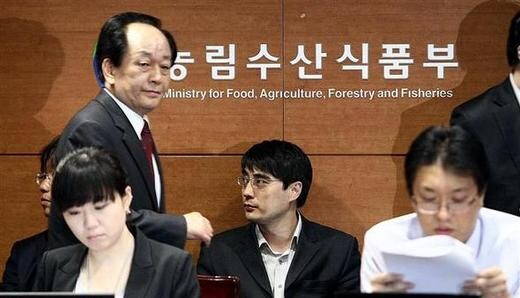hankyoreh
Links to other country sites 다른 나라 사이트 링크
Experts say US beef imports should be halted and investigated

By Kim Hyun-dae, agriculture correspondent
Experts are contending that the government is distorting the spirit of the law and ignoring citizen safety by refusing to put an immediate halt to US beef imports based on the Act on the Prevention of Livestock Epidemics and import hygiene conditions.
“What the Act on the Prevention of Livestock Epidemics (APLE) says is that we need to protect the safety of South Koreans by temporarily halting imports [or quarantine inspections] in cases of ‘urgency’ like the present one where mad cow disease has occurred in the United States, but its pathway and cause have not yet been determined precisely,” trade attorney Song Gi-ho said Thursday.
Song added that once the cause has been determined through investigation, the decision can then be made on whether to continue the suspension or resume imports.
“When the government says it will halt imports only after an investigation to determine whether there’s a problem, this is yet another falsehood that reads the law in the opposite way it was intended to be read,” Song said.
Article 32-2 of APLE, which was enacted in Sept. 2008, states, “important suspension measures, etc., may be taken . . . in cases where emergency measures are needed to protect citizen health and safety . . .after the occurrence of additional cases” of bovine spongiform encephalopathy (BSE).
Similar wording can be found in Article 6 of supplementary import hygiene conditions developed after additional beef negotiations between Seoul and Washington.
After being faced with candlelight vigils protesting the import of US beef, the South Korean government officially announced that it would be amending these rules and responding to BSE in the US by suspending imports, conducting a bilateral epidemiological investigation into the case, and maintaining the import suspension based on the results.
Along similar lines, government advertisements stating, “we will immediately halt imports if mad cow disease is discovered in the United States” ran in several newspapers in May of 2008.
Former Agriculture Minister Kim Sung-hoon said, “In a situation where everything remains uncertain, it shows misplaced priorities to simply announce reinforced quarantine inspections without temporarily suspending imports as stipulated by law.”
Kim added, “Consumer distrust is growing because the South Korean government is telling them just to believe the US government and not worry.”
Park Sang-pyo, policy chief for Veterinarian Solidarity for Public Health, said, “If mad cow disease has been found in the US, then we have to assume that some weakness in the US mad cow disease control system has been revealed.
"We’re giving the US special treatment," Park added, noting that import hygiene conditions with Australia, New Zealand, and Canada all stipulate that the government can halt imports or quarantine inspections immediately.
Park went on to say, "When it comes to the safety of the South Korean public, we need to revise the import hygiene conditions for US beef and put in writing a specific procedure for import suspensions, if only to eliminate the potential for needless controversy."
But Agriculture Minister Suh Kyu-yong said at a press conference Thursday that the APLE gives the government authority by stating that it "may," rather than "must," suspend imports.
"We determined that this did not constitute an ‘urgent’ instance, since the mad cow disease found in the US is not dangerous at all," Suh said.
However, sources are reporting that by early afternoon Wednesday, when news of the US BSE discovery broke, the prevailing view among Agricultural Ministry employees was that there should at least be a suspension of quarantine inspections.
Please direct questions or comments to [english@hani.co.kr]
Editorial・opinion
![[Column] Park Geun-hye déjà vu in Yoon Suk-yeol [Column] Park Geun-hye déjà vu in Yoon Suk-yeol](https://flexible.img.hani.co.kr/flexible/normal/500/300/imgdb/original/2024/0424/651713945113788.jpg) [Column] Park Geun-hye déjà vu in Yoon Suk-yeol
[Column] Park Geun-hye déjà vu in Yoon Suk-yeol![[Editorial] New weight of N. Korea’s nuclear threats makes dialogue all the more urgent [Editorial] New weight of N. Korea’s nuclear threats makes dialogue all the more urgent](https://flexible.img.hani.co.kr/flexible/normal/500/300/imgdb/original/2024/0424/7317139454662664.jpg) [Editorial] New weight of N. Korea’s nuclear threats makes dialogue all the more urgent
[Editorial] New weight of N. Korea’s nuclear threats makes dialogue all the more urgent- [Guest essay] The real reason Korea’s new right wants to dub Rhee a founding father
- [Column] ‘Choson’: Is it time we start referring to N. Korea in its own terms?
- [Editorial] Japan’s rewriting of history with Korea has gone too far
- [Column] The president’s questionable capacity for dialogue
- [Column] Are chaebol firms just pizza pies for families to divvy up as they please?
- [Column] Has Korea, too, crossed the Rubicon on China?
- [Correspondent’s column] In Japan’s alliance with US, echoes of its past alliances with UK
- [Editorial] Does Yoon think the Korean public is wrong?
Most viewed articles
- 1‘We must say no’: Seoul defense chief on Korean, USFK involvement in hypothetical Taiwan crisis
- 2N. Korean delegation’s trip to Iran shows how Pyongyang is leveraging ties with Moscow
- 3Amnesty notes ‘erosion’ of freedom of expression in Korea in annual human rights report
- 4[Column] Park Geun-hye déjà vu in Yoon Suk-yeol
- 5‘Weddingflation’ breaks the bank for Korean couples-to-be
- 6[Reportage] On US campuses, student risk arrest as they call for divestment from Israel
- 7[Guest essay] The real reason Korea’s new right wants to dub Rhee a founding father
- 8[Editorial] New weight of N. Korea’s nuclear threats makes dialogue all the more urgent
- 9Will NewJeans end up collateral damage in internal feud at K-pop juggernaut Hybe?
- 10Why Korea shouldn’t welcome Japan’s newly beefed up defense cooperation with US